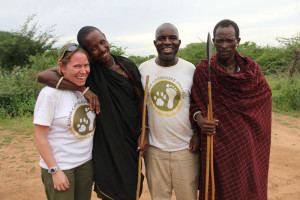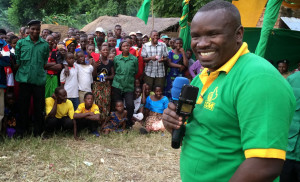by Martin Walsh
WOMEN, LAND AND JUSTICE IN TANZANIA. Helen Dancer. James Currey, Woodbridge, 2015. xxiv + 192 pp. (hardback). ISBN 978-1-84701113-8. £45.
Having seen the author of this book present her work, I had high expectations, and they were not disappointed. This is a well-grounded and carefully thought through study of the difficulty women experience establishing and defending their rights to land in present-day Tanzania. Focused on material from Mount Kilimanjaro, it provides useful reviews of the literature on a number of urgent current issues, relevant far beyond Tanzania: the evolution of land rights in Africa in the context of increasing demand and ‘land grabs’; the rhetoric of human rights and women’s rights in the NGO sector, the internal diversity of that sector, and (more country-specific) the functioning of the court system from local dispute settlement mechanisms upward.
Dancer demonstrates the dearth of easy answers to the many difficult issues raised, such as how to mediate between plural understandings of law and how to ensure equitable outcomes from under-resourced legal institutions. She notes, for instance, that while empirical studies indicate that land titling campaigns often work to the detriment of women’s land claims by vesting land formally in male family heads and marginalising women’s ‘customary’ entitlements, feminist lawyers in Africa are among those who continue to lobby for the use of formal legal mechanisms, such as titling, to assert women’s rights. At the same time, the conclusion makes clear that there are ways of legislating constructively and of working with flawed institutions.
Following a sample of cases through the courts, the book makes clear that the Tanzanian government’s commitment to furthering gender justice is not purely rhetorical; that legislation has over the years succeeded in providing certain legal means for women to assert their rights, and that legal disputes concerning land may well be decided in favour of women claimants. At the same time, it also emerges clearly that it takes guts and perseverance on the part of a woman plaintiff for her case even to reach court. Formal judicial proceedings are typically a late stage in a dispute that has probably already been through several rounds of mediation, formal or informal. The pressure exerted on women to settle, quite possibly to their detriment, within these forums can be great, extending all the way to physical violence. The book brought to mind the Swahili saying kikulacho kiko nguoni mwako; what bites you is in your clothes. The people most likely to imperil a woman’s claim to land are typically close relatives, of her own or of a deceased husband.
The historian may take particular interest in Dancer’s exploration of the interaction between successive layers of legislation. The colonial ethnographer Hans Cory’s summary of patrilineal customary law, for example, remains the official interpretation of customary law for areas considered to be patrilineal, and women have to mobilise the more recent constitutional commitment against gender injustice against it, with varying success. One point that it would have been nice to see pursued further is the connection between land claims and economic stratification, or class. But one book cannot do everything, and this one does quite a lot as it is.
Felicitas Becker
Felicitas Becker is Lecturer in African History at the University of Cambridge, and author of Becoming Muslim in Mainland Tanzania, 1890-2000 (Oxford, 2008), as well as articles in African Affairs, the Journal of African History, African Studies Review, and the Canadian Journal of Development Studies.
IN SEARCH OF PROTECTION: OLDER PEOPLE AND THEIR FIGHT FOR SURVIVAL IN TANZANIA. Helmut Spitzer and Zena Mnasi Mabeyo. Mkuki na Nyota, Dar es Salaam, 2011. 141 pp (paperback). ISBN 978-998708-080-9. Available from African Books Collective, £17.95.
Older people in Tanzania tend to be invisible – and the poorer and more rural they are, the less of a voice they have. Not only is it clear that many older people are marginalised by their own communities, but also their plight has been neglected by NGOs and international agencies, who may prefer to concentrate on more immediately appealing areas such as children, women, water, health, forests, and so on.
This book lifts a corner of this invisibility, providing an informative summary of the situation of older people in Tanzania, against a backdrop of the largely ineffective global, regional and national policy environment. It contains a detailed account of fieldwork done in two locations in Tanzania which usefully highlights rural-urban differences and brings out the considerable gender-based disparities. While older people are generally marginalised, discriminated against and socially excluded in their communities and further afield, older women face even greater discrimination and difficulties. Older people are vulnerable to chronic poverty and in recent years this has been exacerbated by the additional burden thrust upon them by the HIV/AIDS epidemic, that of looking after sick family members and in particular taking on orphaned children.
Spitzer and Mabeyo’s account resonates with the research I did in Tanzania with older people over a decade ago, depressingly showing that not much has changed. However, I was disappointed not to see greater coverage of more nuanced social aspects of old age for women, such as widowhood, polygyny (when the older wife is pushed aside in favour of a younger one), and the significant issue of witchcraft, with its links to inheritance of property rights, and HIV/AIDS, and where older women (as witches) may be blamed for untimely and apparently unexplained deaths.
The book ends with a range of recommendations. Older people in Tanzania lack adequate formal social protection, and are experiencing diminishing family and community support, but the authors argue convincingly that the introduction of a universal non-contributory pension is both fiscally affordable and sustainable, and could play an important role in poverty reduction, if there were ever the political will to implement it.
Kate Kibuga Forrester
Kate Kibuga Forrester lived in Tanzania for 15 years, working as a freelance consultant chiefly in social development. She carried out several research assignments for HelpAge International, focusing on the situation of older people in different locations in the country. She now lives in Dorchester, where she is active in community and environmental affairs.
BUILDING A PEACEFUL NATION: JULIUS NYERERE AND THE ESTABLISHMENT OF SOVEREIGNTY IN TANZANIA, 1960-1964. Paul Bjerk. University of Rochester Press, Rochester NY, 2015. xvii + 374 pp (hardback). ISBN 978-1-58046-505-2. £75.00.
The immediate tasks facing those African governments which took power of newly independent states during the 1960s were to establish political control and limit neo-colonial interference; in other words to establish sovereignty. This was not easy. Economic and administrative capacity was limited, and creating a stable political consensus was difficult in the absence of unpopular colonial rule. To complicate matters, external threats were posed by instability in neighbouring countries and by increasingly interventionist superpower policy in the context of the Cold War. The way in which the TANU government under the leadership of Julius Nyerere was able to negotiate these challenges and create a foundational sovereignty during the period 1960-64 is the subject of this new book by Paul Bjerk, an assistant professor of history at Texas Tech University.
One major limitation facing any researcher investigating post-independence Tanganyikan government policy is that many of the official records from this period remain confidential. In addition to interviewing dozens of key protagonists, Bjerk has attempted to bridge this gap by presenting the contents of a wide range of diplomatic correspondence in which key issues are often discussed frankly. Indeed, the fact that the references and bibliography in this book run to almost 100 pages is testament to his substantial archival research across several countries.
In the introduction, Bjerk states that his book is not intended to be a biography or evaluation of Nyerere. However, sections on Nyerere’s education and his development of Ujamaa ideology – and indeed the book’s subtitle – at times create a contrary impression. Although other figures such as Oscar Kambona and Rashidi Kawawa receive plenty of attention, Nyerere is firmly situated as the book’s key figure, perhaps inevitably given the central role he played in policy formation during this period.
Bjerk’s work is structured thematically, starting with a focus on domestic sovereignty. He evaluates, in turn, measures to limit the threat posed to Nyerere’s government by opposition parties and labour unions, the origins of Ujamaa ideology, early attempts at villagisation, the 1964 mutiny and, finally, the creation of the national youth service. Throughout this section, Bjerk skilfully shows that sovereignty is not simply imposed from above but rather it is the product of social mediation in which both elite and non-elite discourses play important roles.
Bjerk then turns attention to the projection of external sovereignty through foreign policy. He discusses the way in which the Tanganyikan government sought a balance between its principled positions, for example its support for independence movements in Southern Africa and its desire to maintain a non-aligned position in the Cold War. This section also contains a chapter on the Zanzibar Revolution which shows that an American intervention had been imminent before Union with Tanganyika was finally agreed.
Casual readers may find the more academically complex parts of this book off-putting, for example the theoretical sections contained in the introduction and conclusion. However, Bjerk’s work will provide an invaluable resource for those engaged in the academic study of the immediate post-independence period in both Tanzania (Tanganyika) and Africa more broadly.
Robert Macdonald
Robert Macdonald is a PhD student at the Centre of African Studies, University of Edinburgh. He is currently in the final stages of writing up his thesis on voter behaviour in Tanzania.
Also noticed:
THE STORY OF SWAHILI. John M. Mugane. Ohio University Press, Athens,
OH, 2015. xiv + 324 pp. (paperback). ISBN 978-0-89680-293-3. £20.99. This vibrant overview by the Director of the African Language Program in Harvard University has something for everyone interested in the development of Swahili language and literature, including sections on kanga sayings, Swahili soap operas, and the use of Swahili in African American life.
ALISI NDANI YA NCHI YA AJABU. Lewis Carroll. Translated by Ida Hadjivayanis. Evertype, Portlaoise, 2015. xv + 135 pp. (paperback). ISBN 978-1-78201-122-4. £10.95.
Undaunted by the linguistic inventiveness and sheer Englishness of Lewis Carroll’s classic, Ida Hadjivayanis has produced the first Swahili version of Alice’s Adventures in Wonderland to appear in 75 years. This is a must for all lovers of Swahili translation, and with any luck it will find a good market in Tanzania too.
POCKET GUIDE: INSECTS OF EAST AFRICA. Dino J. Martins. Struik Nature, Cape Town, 2014. 152 pp. (paperback). ISBN 978-1-77007-894-9. £7.50.
Dino Martin’s pocket guide is the first of its kind, illustrated with superb colour photographs of the insect groups and species that it describes. So little is known about insects in the five East African countries it covers that readers are encouraged to send in their own observations, photographs and records.
THE KINGDON FIELD GUIDE TO AFRICAN MAMMALS (Second edition). Jonathan Kingdon. Bloomsbury Publishing, London, 2015. 640 pp. (paperback). ISBN 978-1-47291-236-7. £27.00.
Kingdon’s handsomely illustrated field guide, first published in 1997, has now been revised and updated to take account of new information, including developments in the classification of African mammals. Both despite and because of its various idiosyncracies, it is perhaps the best guide to carry around Tanzania.
EAST AFRICAN PLANT COLLECTORS. Diana and Roger Polhill. Kew
Publishing, Kew, 2015. 520 pp. (hardback). ISBN 978-1-84246-371-0. £80.00. Described as “a record of some 2,700 people who have collected herbarium specimens in Uganda, Kenya and Tanzania, […] a supplement to the now complete Flora of Tropical East Africa.” This comprehensive survey of East Africa’s plant collectors is accompanied by line drawings and more than 250 black and white photographs.



